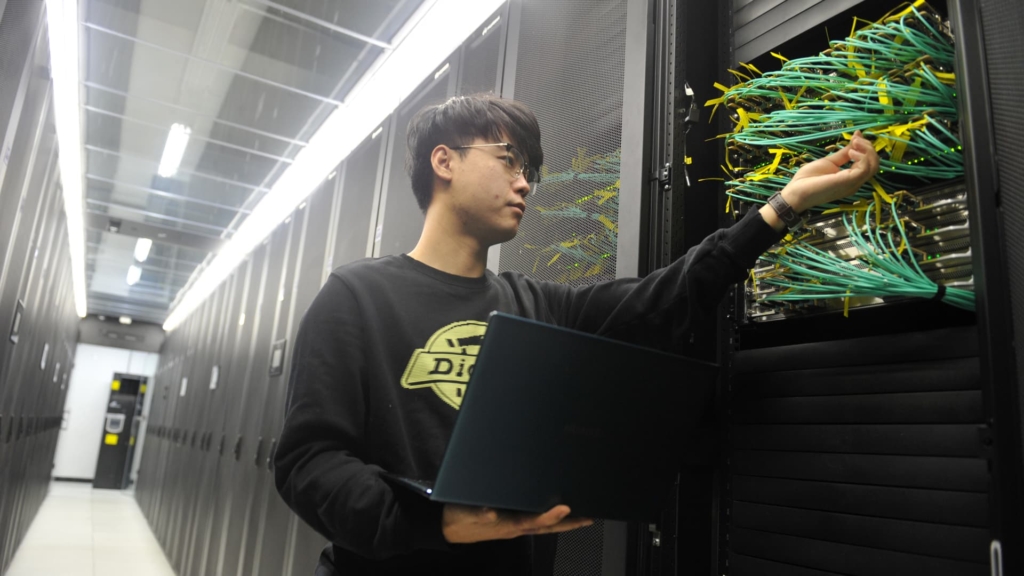In recent months, Chinese corporations have vigorously explored the capabilities of DeepSeek’s generative AI technologies. Reports of cost savings have emerged, with strategists optimistic that this trend will support a rebound in corporate earnings. Bernstein highlighted two high-potential stocks: Kingsoft Office, a Shanghai-listed entity known for its word-processing software WPS, and Kingdee, a Hong Kong-listed firm that provides software solutions for business management.
The analysts observed that during the rise in trade tensions under former U.S. President Donald Trump, there was a significant increase in Chinese spending on domestic information technology, prompted by localization policies aiming to mitigate the repercussions of tariffs. Bernstein elaborated, “AI could emerge as a pivotal technology that allows China to sustain its growth trajectory,” with enhanced promotion of indigenous systems like the Huawei ecosystem.
According to Kingsoft Office’s recent annual report, the AI-enhanced version of WPS attracted 19.68 million monthly active users in mainland China last year. The firm has also launched a variant of WPS compatible with Huawei’s HarmonyOS Next, positioning itself as independent from Android. Meanwhile, Kingdee announced in its recent report a strategic pivot toward becoming a leader in Enterprise Management AI, highlighting new customer acquisitions in the first quarter, including notable names such as Geely and Kweichow Moutai.
The Economist Intelligence Unit forecasts a robust 25% annual growth in China’s AI spending for the upcoming years, potentially contributing 0.13% to the nominal GDP in 2024.
However, recent analyses by Goldman Sachs and Citi are painting a less optimistic picture, as both firms have revised their economic growth forecasts for China downward amidst escalating U.S.-China tensions. In a swift reply to a new wave of U.S. tariffs, China imposed its own set of duties, with both nations enacting tariffs that could reach triple-digit percentages. While China has stated its intention to “ignore” any further U.S. tariff hikes, it remains poised to retaliate against other actions from Washington.
Nomura’s technology research analyst Bing Duan weighed in, noting, “The all-out tariff war could adversely affect the macroeconomy, with potential ripple effects across multiple sectors.” Nonetheless, he remarked that domestic AI demand is likely to remain strong, propelled by innovations from DeepSeek and China’s aspirations for AI leadership.
Duan added, “We favor internet data center and cloud companies as they appear largely immune to the adversities of reciprocal tariffs.” Among their recommended stocks in this sector are state-owned China Mobile and U.S.-listed firms GDS and Vnet. GDS, based in Shanghai, predicts a revenue increase of at least 9.4% this year, climbing to 11.29 billion yuan, while Vnet, operating from Beijing, reported a 28.3% rise in net revenues, reaching 1.63 billion yuan.
The company forecasts a utilization rate of 85% for its wholesale data centers in the Greater Beijing Area by 2025, indicating the potential onset of a supply shortage in the market. Analysts point out that under 5% of the revenues for both GDS and Vnet stem from the U.S., indicating their strong reliance on the Chinese market.
“Our analysis suggests that demand for computing power and infrastructure—especially following the launch of DeepSeek—is a key growth driver for China’s cloud computing and IDC companies, largely unaffected by current tariff increases,” the Nomura team stated. Furthermore, to mitigate the tariff impact on exports, they expect the government will likely encourage investments aimed at bolstering domestic growth in sectors like cloud computing and IDC infrastructure. In the realm of AI software and applications, the analysts hold a positive view of Kingdee and Kingsoft Corp, parent company of Kingsoft Office, as strong investment candidates.


























